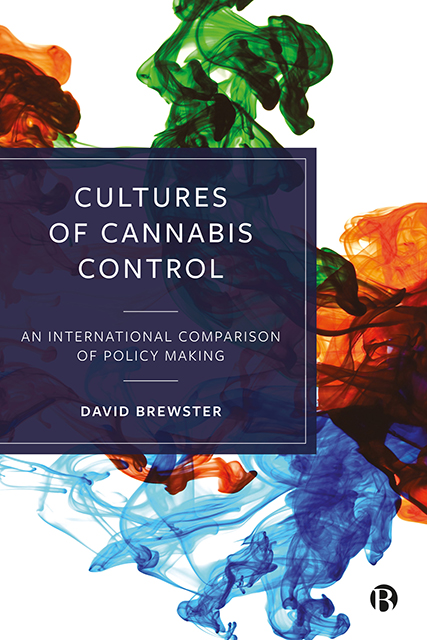Book contents
- Frontmatter
- Contents
- List of Tables
- About the Author
- Acknowledgements
- 1 Introduction
- 2 Cannabis Policy in Global Perspective
- 3 Sociopolitical Change and Cannabis Control
- 4 Problematizing Cannabis
- 5 The ‘Primeval Soup’ of Policy Proposals
- 6 The Political Environment and Windows of Opportunity
- 7 Beyond the National: Policy Negotiation, Resistance and Subversion
- 8 Cultures of Cannabis Control
- 9 Conclusions and Future Directions
- Appendix
- Notes
- References
- Index
9 - Conclusions and Future Directions
Published online by Cambridge University Press: 16 June 2023
- Frontmatter
- Contents
- List of Tables
- About the Author
- Acknowledgements
- 1 Introduction
- 2 Cannabis Policy in Global Perspective
- 3 Sociopolitical Change and Cannabis Control
- 4 Problematizing Cannabis
- 5 The ‘Primeval Soup’ of Policy Proposals
- 6 The Political Environment and Windows of Opportunity
- 7 Beyond the National: Policy Negotiation, Resistance and Subversion
- 8 Cultures of Cannabis Control
- 9 Conclusions and Future Directions
- Appendix
- Notes
- References
- Index
Summary
Introduction
The contemporary control of cannabis reflects a myriad of rapidly changing policy responses. If it was even possible to speak of a broad convergence and consensus around the use of prohibitive regimes throughout the 20th century, developments in the 21st century certainly bring such an assertion into question. In some contexts, prohibitive frameworks have been renewed and strengthened, while in a growing number of others, these have been diluted by depenalization or decriminalization reforms or else entirely replaced by legal regulation.
In order to better understand why this is the case, grasping the processes by which such responses have manifested is clearly vital. As such, the aim of this book was to explore inter-and intra-national policy convergence and divergence in cannabis control, and how similarities and differences in policy-making processes may be best understood and explained.
Principally, this was based on an empirical study of two advanced liberal democracies in Western Europe – England & Wales and the Netherlands – whose recent policy changes, prima facie, appeared to show similarities in the employment of non-adaptive strategies of control. This was further supported by drawing on a range of contrasting cases from around the world, which, overall, have exhibited what could be broadly thought of as adaptive-style reforms.
In this final chapter, we consider the main arguments set forth in the book in the context of their implications for cultures of control, cannabis policy making and criminology, before finishing with a reflection on the methodological approach that underpinned the empirical research and a consideration of future directions in comparative criminology.
Cultures of control, cannabis policy making and Criminology
David Garland’s The Culture of Control was heavily criticized for underplaying the influence of different national and local political institutions and cultures, and for failing to recognize the fundamental messiness, unpredictability and contestation involved in the policy-making process (Matthews, 2002; Young, 2002; Edwards and Hughes, 2005; Tonry, 2009). These critiques are relevant not just to this work, but arguably more so to those who have overly concentrated on the punitive turn, with a dominant assumption of these ‘criminologies of catastrophe’ that globalizing late modern conditions are necessarily accompanied by convergence around ever more restrictive and punitive policy responses (O’Malley, 2000).
- Type
- Chapter
- Information
- Cultures of Cannabis ControlAn International Comparison of Policy Making, pp. 164 - 175Publisher: Bristol University PressPrint publication year: 2022



